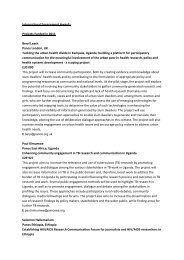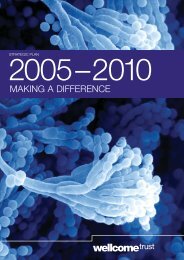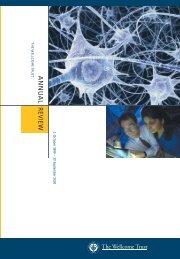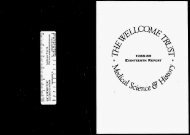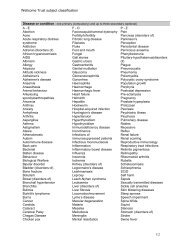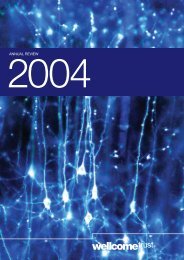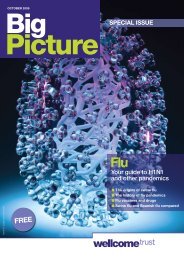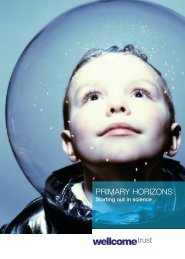Create successful ePaper yourself
Turn your PDF publications into a flip-book with our unique Google optimized e-Paper software.
USING Knowledge | 19<br />
Deciphering<br />
genetic disease<br />
The DECIPHER database is benefiting<br />
patients, clinicians and researchers.<br />
2 3 4<br />
vision of two remained stable while that<br />
of the third improved significantly –<br />
possibly because the disease was at an<br />
earlier stage of progression.<br />
Though preliminary, these findings –<br />
along with those from a similar trial<br />
carried out in the USA – justify trials in<br />
children with less advanced<br />
degeneration and greater potential for<br />
benefit.<br />
Bainbridge JW et al. Effect of gene therapy on visual<br />
function in Leber’s congenital amaurosis. N Engl J Med<br />
2008;358(21):2231–9.<br />
The gene therapy trial was funded by the<br />
Department of Health, the National Institute of<br />
Health Research Biomedical Research Centre<br />
for Ophthalmology and the British Retinitis<br />
Pigmentosa Society.<br />
Chromosomal rearrangements are a<br />
common cause of developmental<br />
conditions in young infants. The<br />
DECIPHER database, set up by Nigel<br />
Carter at the <strong>Wellcome</strong> <strong>Trust</strong> Sanger<br />
Institute and Helen Firth in<br />
Cambridge, enables clinicians and<br />
researchers worldwide to pool<br />
knowledge about the causes and<br />
consequences of these conditions.<br />
Dr Carter has pioneered the development<br />
of tools that can search the entire human<br />
genome for copy number variation –<br />
regions that have been duplicated or<br />
lost. These alterations are a common<br />
cause of developmental conditions.<br />
Traditional methods of diagnosis rely on<br />
microscopic analysis of chromosomes,<br />
but cannot spot subtle changes.<br />
Dr Carter teamed up with Dr Firth, a<br />
clinical geneticist at Addenbrooke’s<br />
Hospital in Cambridge, to develop the<br />
DECIPHER database so new findings<br />
emerging from the use of genomic tools<br />
could be shared globally. As conditions<br />
may be extremely rare, the global reach<br />
can be particularly valuable. For example,<br />
the database enabled researchers to<br />
identify a syndrome caused by a small<br />
deletion on chromosome 17. A similar<br />
cluster of cases – two from Vancouver,<br />
Canada, and one from Cambridge –<br />
revealed a new syndrome linked to loss<br />
of part of chromosome 14.<br />
Connecting cases this way can reassure<br />
clinicians that the genetic change detected<br />
is directly linked to the condition –<br />
everyone has some shuffled DNA, most<br />
of it harmless. Information can also be<br />
shared on the progression of disease.<br />
Researchers can use the information to<br />
investigate genes in the affected regions<br />
and how their loss or duplication might<br />
cause the condition.<br />
Parents also benefit from a diagnosis. As<br />
well as being able to guide clinical care, a<br />
diagnosis can be comforting – parents at<br />
last have an explanation for their child’s<br />
condition and can be reassured that they<br />
were not in any way to blame. It may also<br />
reveal whether they are at risk of having<br />
another affected child.<br />
Since it was set up in 2004, more than<br />
100 centres have registered with<br />
DECIPHER. More generally, genomic<br />
analysis has been taken up by many<br />
medical genetic centres as an adjunct to<br />
conventional methods. And at least one<br />
centre has already abandoned the<br />
microscope in favour of DNA-based tools.<br />
Zahir F et al. Novel deletions of 14q11.2 associated with<br />
developmental delay, cognitive impairment and similar<br />
minor anomalies in three children. J Med Genet<br />
2007;44;556–61.<br />
Shaw-Smith C et al. Microdeletion encompassing<br />
MAPT at chromosome 17q21.3 is associated with<br />
developmental delay and learning disability. Nat Genet<br />
2006;38;1032–7.





